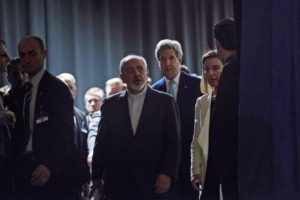
New York Times:
A year after President Obama’s nuclear deal with Iran, the worst predictions of what would happen next have not come to pass.
The Iranians, defying the expectations of the deal’s most vociferous critics, gave up 98 percent of their nuclear material. They dismantled thousands of centrifuges and filled the core of a major plutonium reactor with cement. Inspectors roam their facilities.
By late January, even Israel’s top military officer said he was impressed. “The deal has actually removed the most serious danger to Israel’s existence for the foreseeable future,” Lt. Gen. Gadi Eisenkot, the chief of staff of the Israel Defense Forces, told a conference in Tel Aviv, “and greatly reduced the threat over the longer term.”
But if the celebrations inside the White House this week appear muted, it is in part because very little about the Washington-Tehran relationship outside the strict parameters of the 130-page agreement has improved. Tehran is still sending its forces to support President Bashar al-Assad of Syria and to gain influence in Iraq, and now has begun to honor its fallen soldiers there as heroes. Taking advantage of a newly worded United Nations resolution that merely “calls upon” Iran to limit its missile testing, it has kept up a steady pace of tests, with more and more capable weaponry. The United States has protested, but has recognized that Russia and China would never permit the imposition of sanctions.
The agreement, of course, covered only Iran’s nuclear activity — the most urgent problem. The goal was to ensure that it would take more than a year for Iran to assemble the makings of a bomb — rather than the few months American intelligence agencies believed it would have required a year ago.
Today few dispute that it would take Tehran at least that long — and probably much longer. As a result, threats from Israel that a strike against Iran’s facilities might be necessary have ceased, even from Prime Minister Benjamin Netanyahu, who has fallen largely silent about the agreement after the dire warnings he offered in an attempt to sink it.
Yet a year later, the easing of economic sanctions against Iran has gone much more slowly than most Iranians expected, leading to a sharp decline in popular support for the deal and the government of President Hassan Rouhani, which staked its political future on the negotiation.
Iran’s Supreme Leader Shakes Up Military Command JUNE 28, 2016
Iran, Once Quiet About Its Casualties in Syria and Iraq, Now Glorifies Them JULY 9, 2016
For Hillary Clinton and John Kerry, Divergent Paths to Iran Nuclear Talks MAY 2, 2016
Obama-Netanyahu Rift Impedes U.S. Offer of Record Aid Deal for Israel APRIL 28, 2016
THE INTERPRETER
Maybe North Korea’s Nuclear Goals Are More Serious Than Once Thought JULY 13, 2016
And that in turn threatens the biggest bet of the deal: that Washington’s fraught relationship with Iran would begin to turn, as it has with Cuba and Myanmar. Mr. Obama’s top aides say it is far too early for that; the moment will come, they argue, only after the death of the supreme leader, Ayatollah Ali Khamenei. Even then, there is no assurance hard-liners will not prevail in the struggle for influence inside Iran.
“It’s complicated,” Secretary of State John Kerry, who staked much of his reputation on the deal, acknowledged over the course of two recent conversations, one in Warsaw during a NATO summit meeting, and a follow-up discussion in Washington. “Without this agreement there would be no chance of talking or having this conversation” with Iran, Mr. Kerry said. “We’d be talking about, ‘O.K., what is next in the confrontation route?’”
